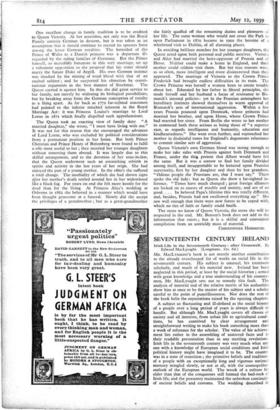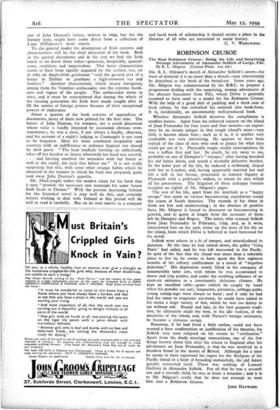SEVENTEENTH CENTURY IRELAND
MR. MACLYSAGHT'S book is not merely another contribution to the already overcharged list of works on social, life in the seventeenth century. His subject is unusual, his treatment scholarly, and much of his material new. Ireland has been neglected in this period, at least by the social historian ; armed with great knowledge and a true understanding of his country- men, Mr. MacLysaght sets out to remedy this fault. The analysis of material and of the relative merits of his authorities show him at once to be the master of his subject and a scholar careful to the point of punctiliousness. Nor does the rest of the book belie the expectations raised by the opening chapters.
A subject so fluctuating and ill-defined as the social history of a people over a long period of years is always difficult to handle. But although Mr. MacLysaght covers all classes of society and all interests, from urban life to agricultural condi- tions, he has contrived by clear arrangement and straightforward writing to make his book something more than a work of reference for the scholar. The value of his achieve- ment lies rather in the assembling of scattered facts and in their readable presentation than in any startling revelations. Irish life in the seventeenth century was very much what any one with a knowledge of European social conditions and Irish political history might have imagined it to be. The countr. was in a state of transition ; the primitive beliefs and tradition k- of a people with an exceptionally long and vigorous national memory mingled slowly, or not at all, with the cosmopolitan outlook of the European world. The wreck of a culture far older than that of the conquerors still formed. the bed-rock of Irish life, and the peasantry maintained the unbroken continuity of ancient beliefs and customs. The wedding described in
one of John Dunton's letters, written in 1699, but for the literary style, might have come direct from a collection of Liam O'Flaherty's short stories.
To the general reader the description of Irish customs and characteristics will be the chief attraction of the book. Both in the quoted documents and in the text we find the Irish much as we know them today—generous, hospitable, quarrel- some, credulous and improvident. This latter characteristic seems to have been rapidly acquired by the settlers, too, tar in 1665 an Anglo-Irish gentleman " sold the ground plot of a house in Dublin to purchase a high-crowned oat and feathers." Another characteristic which strum foreigners, among them the Venetian ambassador, was the extreme hardi- ness and vigour of the people. The ambassador wrote in 1611, and it must be remembered that during the whole of the ensuing generation the Irish were much sought after to fill the armies of foreign princes because of their exceptional powers of endurance.
About a quarter of the book consists of appendices of documents, many of them now printed for the first time. The letters of John Dunton, for instance, are a social document whose value is hardly impaired by occasional obvious over- statements ; he was a close, if not always a kindly, observer, and his account of a night's lodging in Connaught is not soon to be forgotten. Here his hosts combined hospitality and courtesy with an indifference to ordinary hygiene not shared by their guest. " The kind landlady haveing no tablecloath, takes off her kercher or linnen wherewith her head was cover'd. . . . and haveing smothed the wrinekles with her hands as well as she could, she layd that before me." It is not really surprising that this, with some other strange habits which he observed in the manner in which his food was prepared, quite took away John Dunton's appetite.
Mr. MacLysaght makes the modest claim for his book that it may " provide the necessary raw materials for some future Irish Scott or Dumas." With the present increasing fashion for the historical novel it may well do this, and certainly writers wishing to deal with Ireland at this period will do well to read it carefully. But on its own merits as a compact and lucid work of scholarship it should secure a place in the libraries of all who are interested in social history.
C. V. WEDGWOOD.



















































 Previous page
Previous page